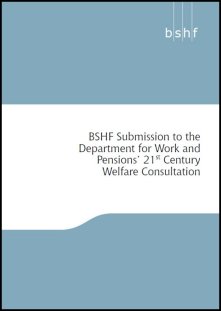
The DWP published a consultation paper (Cm 7913), 21st Century Welfare, in July 2010. The consultation closed on 1 October 2010. This submission is BSHF’s evidence to the consultation.
It is essential that the cost of the welfare system be managed to ensure that it remains sustainable in the long term. However, observations like those contained in 21st Century Welfare that “the cost of welfare is rising at a time when we can least afford it” fail to accurately reflect the situation. It is inherent in the nature of a functioning benefits system that the cost will increase in a downturn, at the same time as tax revenues are reducing.
In the short-term the government’s approach should centre on creating an environment in which it is possible for people to find work (i.e. reducing unemployment) whilst reforming the system to ensure that work will pay once the availability of employment increases. Over the medium to long term, the government will need to address increases in rental prices.
As well as being a fundamental human need, housing is a vital part of the welfare system because:
- It is typically households’ largest payment;
- It is one of the most difficult items of household expenditure to change;
- There are massive regional and local variations in the cost of housing.
If the reforms arising from 21st Century Welfare do not deal effectively with housing they will fail to achieve their objectives.
As a long term goal, greater emphasis should be put on reducing the cost of housing, through increasing the delivery of affordable housing as well as other approaches, to create a more sustainable housing system.



Join the discussion